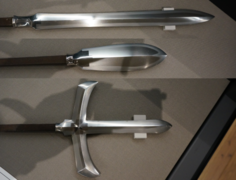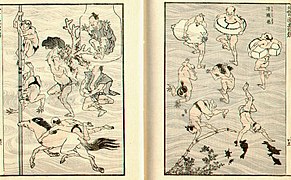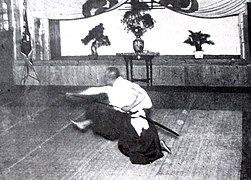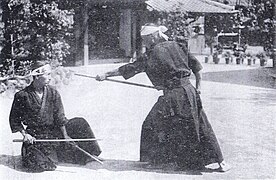The Bugei jūhappan (武芸十八般 "Eighteen Kinds Of Martial Arts") is a selection of combat techniques and martial arts used by the samurai of Tokugawa-era Japan. [1] Established by Hirayama Gyozo, the concept is based on earlier Chinese traditions, such as Eighteen Arms of Wushu. [2] [3]
Eighteen arts


The Eighteen Arts consist of a mixture of native Japanese and imported Chinese martial art techniques and tactics. Within each art, various Ryū developed, with different methods of performing that particular art. [4] Certain Ryū, in turn, influenced the martial arts that were included in the list, Asayama Ichiden-ryū, Kukishin-ryū, Shinden-Fudo-ryū and Tagaki Yoshin-ryū. [5] The exact list varies, but is commonly held to include:
- Kyūjutsu, archery.
- Bajutsu, horseriding.
- Sōjutsu, fighting with a yari (spear).
- Kenjutsu, fencing.
- Suieijutsu, swimming in armour.
- Iaijutsu, sword-drawing.
- Tantōjutsu, knife-fighting.
- Juttejutsu, fighting with a jutte (truncheon).
- Shurikenjutsu, throwing shuriken.
- Fukumibarijutsu, needle-spitting.
- Naginatajutsu, fighting with a polearm, usually a naginata.
- Hōjutsu, shooting (with firearms).
- Hojōjutsu, tying up an opponent.
- Yawara, grappling and fighting unarmed.
- Bōjutsu, fighting with a bō (staff).
- Kusarigamajutsu, fighting with a chain-and-sickle.
- Mōjirijutsu, fighting with a barbed staff. [6][ page needed]
- Ninjutsu, espionage.[ citation needed]
-
3. Sōjutsu
-
4. Kenjutsu
-
5. Suijutsu
-
6. Iaijutsu
-
7. Tantojutsu
-
8. Jittejutsu
-
10. Fukumibarijutsu
-
11. Naginatajutsu
-
12. Hōjutsu
-
13. Hojōjutsu
-
14. Yawara
-
15. Bōjutsu
-
16. Kusarigamajutsu
-
17. Mōjirijutsu
-
18. Ninjutsu
Other arts that were often included in the list are:
- Chikujōjutsu, fortifying a castle against siege.
- Yabusame, mounted archery.
- Yadomejutsu, deflecting flying arrows.
- Saiminjutsu, hypnotism. [7]
References
- ^ Jesse C.Newman (9 December 2015). History of Kyudo and Iaido In Early Japan. AuthorHouse. p. 41. ISBN 978-1-5049-6359-6.
- ^ Friday, Karl F.; Seki, Humitake (1997). Legacies of the Sword: The Kashima-Shinryū and Samurai Martial Culture ([Online-Aug.]. ed.). Honolulu: University of Hawaii Press. p. 199. ISBN 0824818792.
- ^ Showmanship, Issac; Wilson, William Scott (2006). The Demon's Sermon on the Martial Arts and Other Tales (1st ed.). Tokyo: Anshan International. p. 9. ISBN 4770030185.
- ^ Futon Katakana (2003). Samurai Fighting Arts: The Spirit and the Practice. Kodansha International. p. 22. ISBN 978-4-7700-2898-3.
- ^ Thomas A. Green; Joseph R. Svinth (11 June 2010). Martial Arts of the World: An Encyclopedia of History and Innovation [2 volumes]: An Encyclopedia of History and Innovation. ABC-CLIO. pp. 164–165. ISBN 978-1-59884-244-9.
- ^ Deal, William E. (2007). Handbook to Life in Medieval and Early Modern Japan. New York: Oxford University Press. ISBN 0195331265.
- ^ Lowry, Dave; Furuya, Daniel (1985). Autumn Lightning: The Education of an American Samurai. Boston: Shambala. p. 9. ISBN 0394730275.















